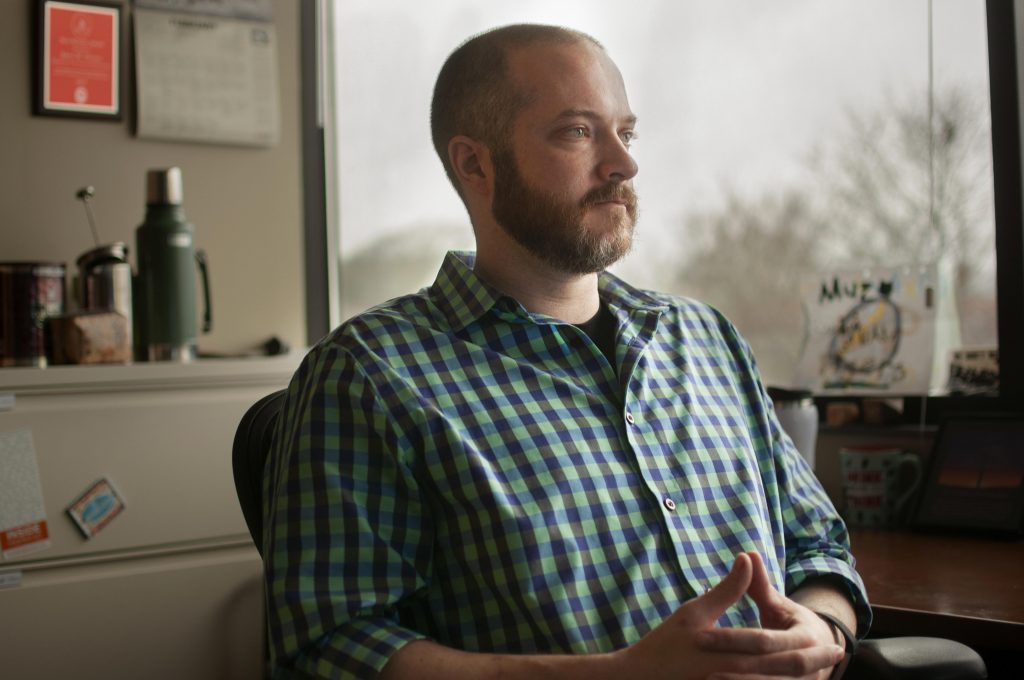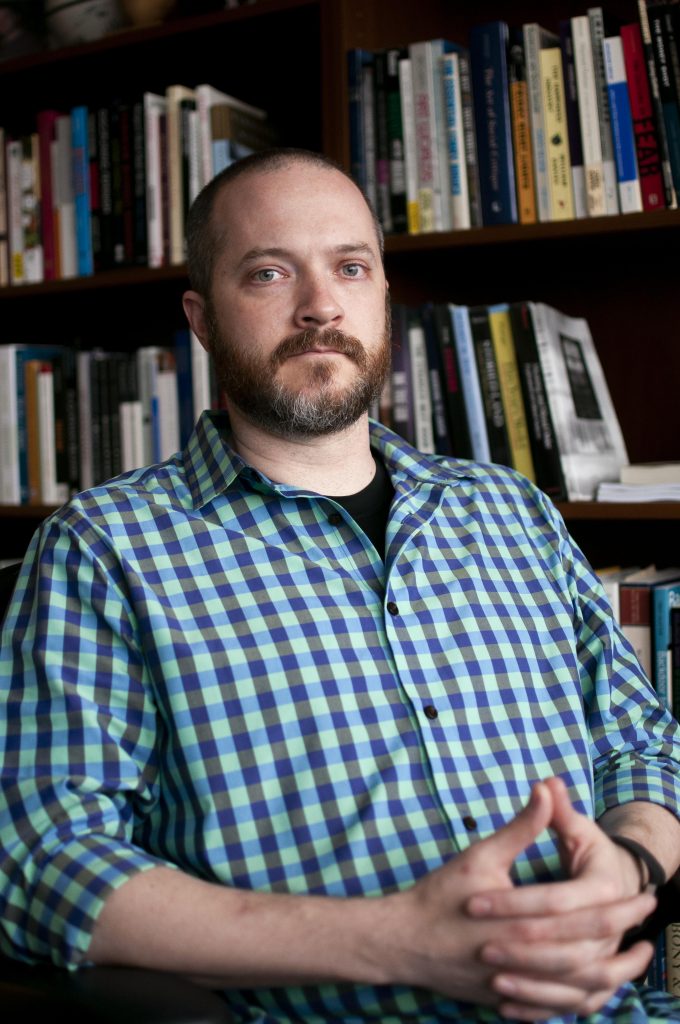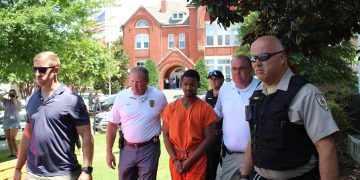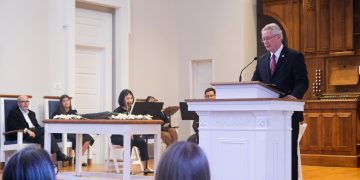James Thomas’s nose crinkles when he smiles, which is more often than his Twitter followers might think.
“I get the sense that people who don’t know me well think that there’s this sociologist on campus who puts out these confrontational things, a one-note person,” he said. “I’m not that. I’m a very good classroom instructor. I’m really good at my job.”
The sociology professor has taught at the University of Mississippi since August 2012 and has been on Twitter since February 2011. Since the creation of his Twitter profile, with the intentional handle @Insurgent_Prof, Thomas has tweeted about 18,600 times and has garnered 1,651 followers.
His profile biography, short and to the point, states, “Husband. Father. Sociologist. Sower of Discourse. Slayer of Nazis. Author of books. #ActualSocialScientist making it in Mississippi. Tweets are my own.”
Though Thomas most closely relates with the former identifiers in his biography, the latter is the most important, especially as of late.

Thomas, an outspoken “sower of discourse” on Twitter and no stranger to online controversy, was denounced by the online and university communities last semester for a tweet that later drew a response from the FBI.
On Oct. 6, 2018, Thomas tweeted, “Don’t just interrupt a senator’s meal, y’all. Put your whole damn fingers in their salads. Take their apps and distribute them to the other diners. Bring boxes and take their food home with you on the way out. They don’t deserve your civility.”
The tweet came a few minutes after and was a response to Thomas’s retweet of a post made by NBC’s Joe Scarborough that said, “Don’t yell at senators, don’t shout at people in restaurants, don’t rage on about past votes.”
On Oct. 13, the Our State Flag Foundation’s Facebook page shared a screenshot of Thomas’s tweet that gained considerable traction online and called for Thomas to be fired from the university, describing Thomas as a “radical agitator” who was “calling for outright uncivil illegal harassment.”
The tweets began to pour in, as did hundreds of concerned emails to then-Chancellor Jeffrey Vitter. As revealed in a public records request, people from all over the country, including donors and alumni, emailed Vitter about the tweet in the weeks following. In Vitter’s inbox, parents threatened to take Ole Miss off their sons’ and daughters’ prospective college lists, and alumni threatened to halt donations to the university, imploring the chancellor to take a strictly condemnatory stance. Many even requested the professor’s firing.
“(Thomas) has besmudged the good name of Ole Miss. I’m calling for you, as leader of this hallowed university, to terminate his employment immediately,” one email from Oct. 17 read.
In January, representatives from the Federal Bureau of Investigations visited Thomas in response to his then-three-month-old tweet. Thomas said the men were “just doing their jobs” and described them as “very nice,” but he wondered who pressured the FBI to come to his office. Some of his critics on Twitter tagged the FBI in their posts.
Thomas said his tweet was a reaction to the news circulating at that time, like the Brett Kavanaugh Supreme Court hearing. He checked Twitter and took issue with people saying that confronting their elected officials isn’t democratic.
“I take issue with that as a human who’s interested in preserving people’s rights and as a scholar,” he said.
More than a week after Thomas’s initial Twitter post, Vitter condemned it on his personal Facebook page without naming Thomas himself.
“A recent social media post by a UM faculty member did not reflect the values articulated by the university, such as respect for the dignity of each individual and civility and fairness,” Vitter’s post read. “While I passionately support free speech, I condemn statements that encourage acts of aggression.”
Thomas said university administration did not reach out to him prior to the chancellor’s post, and Thomas was “infuriated” when he first saw it.
“I was livid,” he said. “A chancellor’s first responsibility is to the institution and his faculty and his students. It’s not to your donors or any people outside of the university who claim they have a stake in it. It’s to the people on this campus. Period.”
Thomas claims his tweet didn’t “go viral” until the then-chancellor’s response. After Vitter’s Facebook post, Thomas said, his tweet was picked up by conservative news outlet Campus Reform and then by Fox News and Breitbart. Over the course of the next two or three weeks, Thomas got “roughly 90 voicemails” from people from all over the country. One person found his personal cellphone number.
“I wasn’t expecting the huge response. I didn’t quite literally mean it. I meant confront your elected official in public,” he said. “I think, with the rare exception of people who post comments on online forums, most people understood what I was saying. I wasn’t going to ask people to strike others.”
A security guard was hired for “about a week” to patrol Lamar Hall, where Thomas’s office is located, after the university received emails that included some threats. Thomas said administration was aware of the hire.

“There were calls that were alarming. There were enough threats being made in online comment sections that our department chair and UPD felt it best to have an officer on our floor and a vehicle patrol around our building,” Thomas said. “Other people in our department were feeling concerned about coming to work.”
Thomas’s tweet also came a few weeks after the namesake of the University of Mississippi School of Journalism and New Media, Ed Meek, made a sexist and racist Facebook post, which garnered a response from university administration and the campus in the days and weeks following. Meek’s name has since been removed from the journalism school. Many compared Meek’s post with Thomas’s, which Thomas thinks is “absurd.”
“Somehow, these two things have been flattened and equivocated, which is a disservice to people … and endangers people because of what it does to minimize racism and sexism themselves,” Thomas said.
In an email addressed to university senior leadership with the subject line “‘Back pocket’ talking points” and revealed to The Daily Mississippian in a public records request, Associate Vice Chancellor for Strategic Communications and Marketing Jim Zook addressed the comparison to Meek’s post and Thomas’s tweet. He said the university “would like to do all that we can … but we have to be careful and deliberate since free speech is one of the most fundamental rights of an individual and academic freedom one of the fundamental rights of a faculty member.”
Additionally, the UM Race Diary Project was released four days after Thomas’s tweet but four days before Vitter’s response to it. The UM Race Diary Project is the culmination of a year-long collaboration between four sociology professors, including Thomas, that analyzes and highlights race-related microaggressions at the university during the 2014-15 academic year. Vitter responded to the research in a column to the DM on Oct. 11.
In an interview with The Chronicle for Higher Education in early November 2018, chairman of the university faculty senate Brice Noonan said that the fallout from the Thomas tweet and the report on microaggressions have made things “a bit crazy” on campus.
Thomas is no stranger to controversy on social media. As the faculty advisor for the University of Mississippi chapter of the NAACP and a civil rights activist, Thomas was involved in the “Take Down the Flag” protests on campus in 2015. During that time, Thomas made equally controversial posts, and the Our State Flag Foundation made posts about him, too. But prior to this, the university had never reacted. Thomas said that when Vitter published the post about him, it broke a certain chain of command that exists on the university level.
“The normal process for the American Association of University Professors (AAUP), when you have a question about faculty speech as it happens internally, there’s a reaching down from the upward administration to chair to faculty and then communicating back up,” Thomas said. “That was broken by the chancellor going to Facebook before that chain could fully unfold.”
Thomas emphasized that Vitter’s statement reflected no understanding of what the role of the institution is in promoting academic freedom and expression.
University of Mississippi Communications declined to respond to questions about Vitter for this article.
Sociology department chair Jeffrey Jackson, when asked for comment, said Thomas was “an outstanding faculty member who is doing excellent research and teaching for the university.”
Southern author Kiese Laymon, a university English professor, thinks that the administration should always protect faculty who are trying to use their words to “honor, explore and protect vulnerable people.”
“I still haven’t heard from anyone why what JT said was wrong,” Laymon said. “You can’t have two armed Confederate soldiers greeting people when they come to town and the Square and plenty of buildings named for violent segregationists and then somehow attempt to call out alleged violence from a member of your faculty. The institution and town taught us that violence here gets commemorated.”
Laymon published a satirical tweet on Sept. 12, 2018, about a month before Thomas’s controversial tweet, referring to President Donald Trump as having a “juicy booty” and was also circulated by Campus Reform.
“Folks didn’t like that,” Laymon said.
Laymon added that the nature of his job brings “threats from encrypted email addresses or actual mail” as well.
“I’m not even sure what academic freedom means,” he said. “I’ve been getting threats for almost a decade, and none of the institutions I’ve worked at have done much to counter those threats.”
According to Rod Guajardo, associate director of strategic communications for the university, the university’s policy on academic freedom, which was last updated in 2011, endorses the 1940 Statement of Principles on Academic Freedom and Tenure of the AAUP. The AAUP’s statement says that teachers are entitled to “full freedom” in research and the research’s publication. Additionally, teachers are entitled to freedom in the classroom in discussing their subject and, when speaking as citizens, “should be free from institutional censorship or discipline.” The university’s policy, according to Guajardo, also endorses the Statement on Professional Ethics issued by AAUP, both unlimited by state law or IHL policy.
Guajardo said that the university encourages everyone “engaged in our academic enterprise to recognize these principles and the responsibilities that accompany them.”
Thomas stressed that faculty cannot be constrained from speaking out because, as scholars, they “have a responsibility to the state and our larger public to speak on public concern.” He believes that academic freedom is especially important on a campus like Ole Miss’s that has a “history of suppressing academic freedom.”
“We have a responsibility to be a beacon and leader on these issues,” Thomas said. “That involves risk, and we are a risk-averse institution. We can’t be risk-averse. We have to be the ones out there taking the chances. I’m not trying to do harm. … It’s about rebuilding.”
Thomas also hopes that even his critics on social media recognize that when he takes to Twitter, it’s not too far off base from what he believes it means to “publicly engage.”
William Nowell, a former student of Thomas’s who graduated in December 2018, said that Thomas’s Twitter presence didn’t come up in class, though most students knew about it. He didn’t think Thomas’s statement could be considered inappropriate or more threatening than any other political tweets.
“I’ve met a great many different professors … and I consider Dr. Thomas as one among the best professors I’ve had as an undergraduate,” he said.
Now, months later, Thomas doesn’t think his tweet was out of line.
“I am who I am, and my commitments are what they are. I’m committed to using the knowledge and expertise that I have to draw critical attention to social problems … and hopefully inspiring others and trying to inspire myself to do something about those things. That has not changed, and it will not change,” he said. “I have to do my part. I’m sorry it’s taken up so much time of people’s days, but I don’t regret a single thing I said.”
Information obtained from a public records request revealed that the university requested Thomas’s class schedule in the days after his tweet, which Guajardo maintains was so “UPD would know where and when he was in the classroom in order to most effectively address the security concerns that arose in response to Dr. Thomas’s tweet.”
However, Thomas isn’t so sure. He spoke to the ACLU, along with the AAUP and his regional union representatives, in case he lost his job.
These days, Thomas said, he plans to be a bit more cautious on social media as a faculty member of the university, though he will “speak truth to power when it needs to be spoken.”
“I love coming to work every day. I love this campus, and I love working in Mississippi because if you have commitments to anti-racism and fighting poverty and combating inequality, then Mississippi is the place for you, so I see it as the place for me,” he said. “Now, I have a bit more clarity about the degree to which those commitments are fully embraced by the university brand.”


























